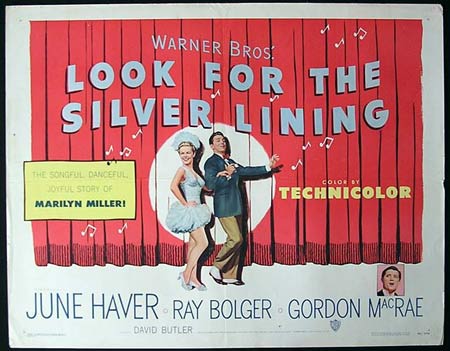
LOOK FOR THE SILVER LINING
US, 1949, 106 minutes. Colour.
June Haver, Ray Bolger, Gordon Mc Rae, Charles Ruggles, Rosemary De Camp, Lee Wilde, Lyn Wilde, Dick Simmons, S.Z. Sakall.
Directed by David Butler .
Look for the Silver Lining is a biopic of Broadway star Marilyn Miller. It is a lush biopic from Warner Bros in the bright-coloured 1940s and 50s style. It features June Haver as Marilyn Miller, June Haver having had some success on screen with a number of musicals like Three Little Girls in Blue, The Dolly Sisters, Oh, What a Beautiful Doll. (She was to leave film-making in 1953 and enter a convent. However, ill health forced her to leave, she married Fred Mac Murray and stayed with him for almost four decades.)
The film also stars Ray Bolger as vaudeville dancer Jack Donahue. This gives him the possibility of doing a great number of comic dance routines. Bolger did not appear in many films but did some routines in Rosalie and was famous, of course, for the Scarecrow in The Wizard of Oz. He also made April in Paris with Doris Day and a film version of his stage success in Charley’s Aunt, Where’s Charley. He appeared with Jack Lemmon, as his father, in the 70s television version of John Osborne’s The Entertainer.
Gordon Mc Rae appears in an early role as Marilyn Miller’s husband, a singer, who died in a car crash on the night that she opened on Broadway in Sally. Charles Ruggles and Rosemary De Camp enjoy themselves as Marilyn Miller’s parents.
The film is quite a sanitised version of Marilyn Miller’s life – which, if the details are to be believed, does not quite bear looking into. However, this was the style of the 1940s. The story comes from Harry Ruby and Bert Kalmar, songwriters who were then the subject of a biography the next years in Three Little Words with Fred Astaire and Red Skelton. The screenplay was written by Phoebe and Henry Ephron, the parents of screenwriter Norah Ephron and Delia Ephron.
There are plenty of songs, plenty of Dances. June Haver is an effective dancer – and there is music, especially by Jerome Kern, the title song from Sally, Look for the Silver Lining as well as Who, which provides the background for a dance by Ray Bolger.
David Butler directed a number of musicals at Warner Bros at this time, especially with Doris Day and Gordon Mc Rae. His films include The Daughter of Rosie O’ Grady, Tea for Two, Lullaby of Broadway, Where’s Charley, April in Paris, By the Light of the Silvery Moon and Calamity Jane.
The film offers a picture of what vaudeville was like at the beginning of the 20th century and the transition to the Broadway musicals.
1. An entertaining biopic? Marilyn Miller and her career? Her fame? On stage? (A sanitised biopic?)
2. The bright colour photography, the vaudeville shows of the 20th century, the Midwestern American towns? The transition to New York, the bright lights of the city, Broadway?
3. The musical score, the range of songs, Look for the Silver Lining, Who? Comic songs for Charles Ruggles? Songs for the Miller family? For Gordon MacRae?
4. The framework of the film, Marilyn Miller at thirty-six, her illness, the man with the poster of the family, her reminiscences? The fact that she died in 1936 of complications after an operation for sinus trouble?
5. The young Marilyn, the performance by her mother and father and two sisters on stage? The songs, the costumes, the style? The vaudeville audiences? Marilyn’s arrival fourteen years old, from her grandmother, wanting to be in the show, the encounter with Jack Donohue, putting her foot in it? His calling her Princess?
6. Jack Donohue, a genial character, his skill in dancing? His friendship with Marilyn, always supporting her? Her infatuation, his getting the agent from Broadway to see her? She thinking he was going to propose? His explanation about his marriage, the photo of his child? Her later seeing it just as a crush? His continued support, dancing with her, the night Sally opened, Frank Carter’s death?
7. Marilyn, her going on stage with Jack after her family had the mumps? Getting the contract? Her love of dancing, singing? Her transition to Broadway after the songs in London? Her sisters wanting to get married, her father being her agent (and his irritation with Jack)? The devotion of her mother?
8. Broadway, dancing, the reviews and her success? The rehearsals with Frank Carter, their mutual dislike? His gift of the elephant, encouraging her? Pretending to the authorities about her age? His singing with her, success? His straight talk with her, her becoming the star and prima donna? His signing up, going to France, World War One, his return, her happiness? Their marriage?
9. Ziegfeld, the invitation to a show? Sally and her not wanting to do it? Thinking it beneath her? Frank urging her, people persuading her? The performance, her waiting for Frank, her nervousness, the token broken elephant toy? Her success, the news that Frank had died? Her grief, carrying on with the show?
10. Her return to work, wanting to continue on stage? Her career and its success?
11. An idealised story of a Broadway star? The ideals of the 1940s and 50s – the American dream? (And some of the realities rather a nightmare?)